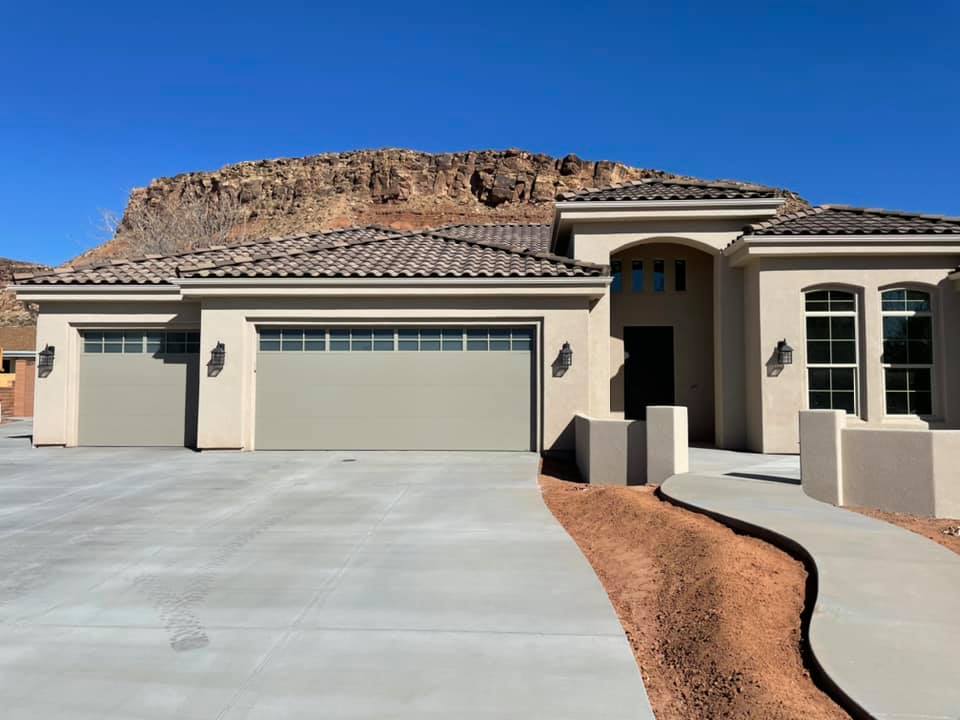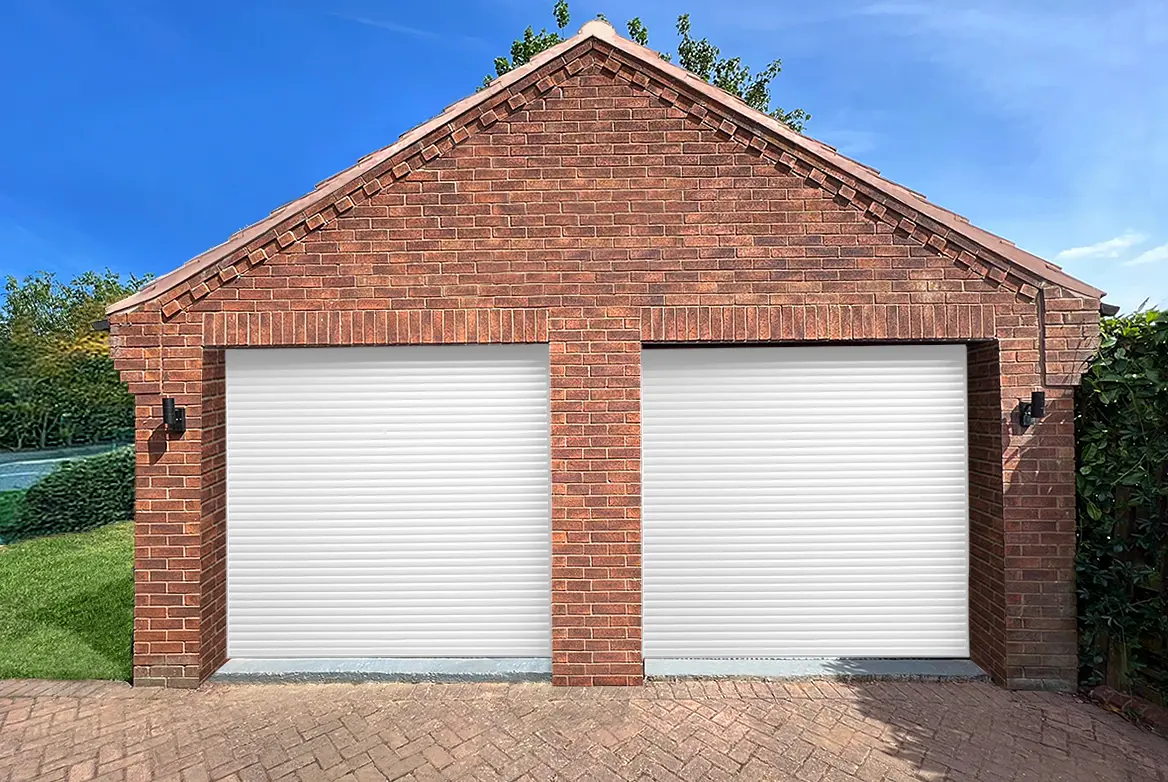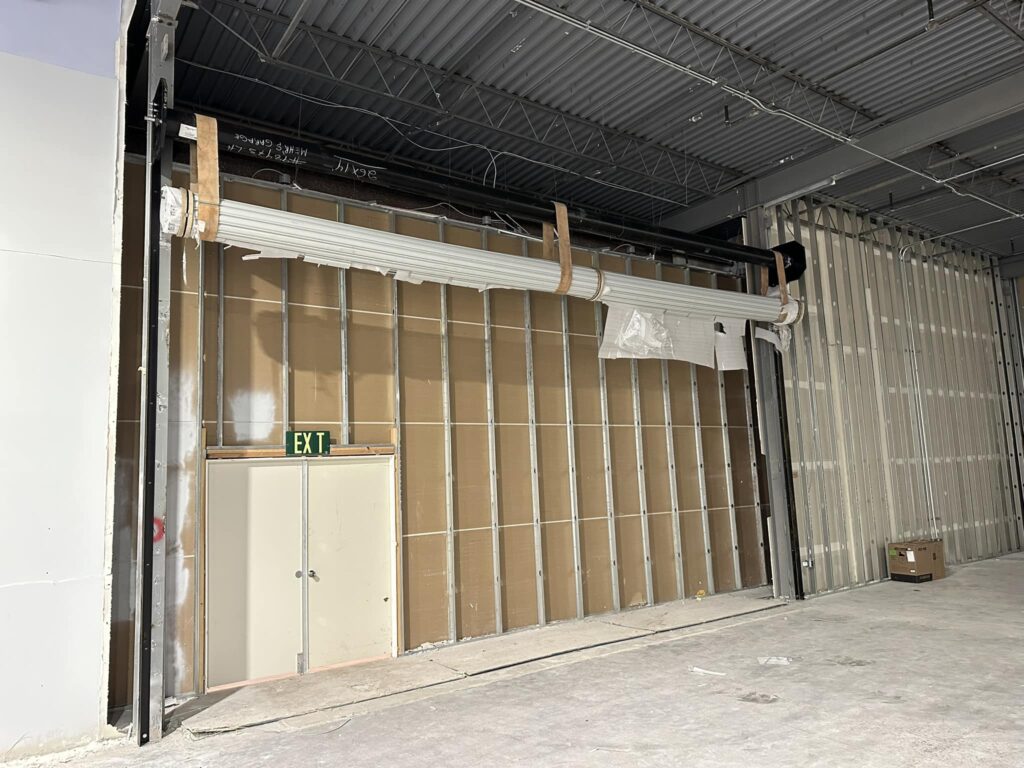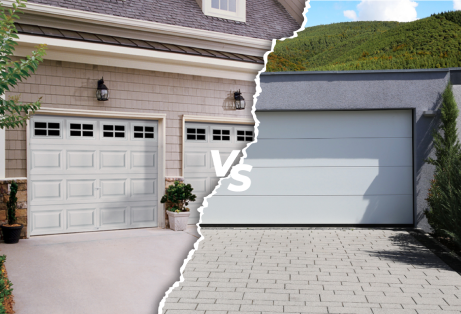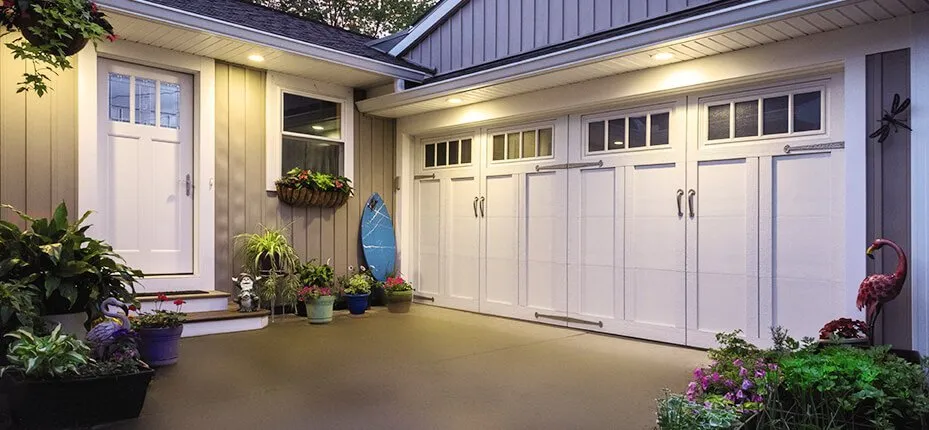Is your garage door not opening or making strange noises? Quick fixes are at your fingertips. Our comprehensive guide on garage door repairs focuses on troubleshooting, resolving common issues, and preventative measures. Get ready to learn what’s wrong with your garage and how to fix it — or when to call in the pros for backup. This article is your toolbox for a smoothly-running garage door.
Garage doors may appear straightforward, but they are complex systems. Their operation depends on a robust interplay of cables and hefty torsion springs that counterbalance the door’s weight for effortless functioning. Sustaining these components with consistent upkeep and inspections is crucial to averting mishaps and extending the lifespan of your garage door.
Consider hoisting a garage door that could tip the scales between 250 and 600 pounds. That’s when springs play their pivotal role. Torsion springs, positioned above the opening of the garage, in conjunction with extension springs situated along both sides’ tracks, facilitate this process. Wound under tension, these springs generate torque as they uncoil during the door’s ascent and retighten to peak tension when it descends. Keeping these components in prime working order is critical due to safety hazards and functionality loss if they fail — often requiring immediate repair.
Cables are integral to this system by supporting spring function—particularly alongside extension springs—a more old-fashioned variety of spring mechanisms connected near track supports. They employ an interplay of pulleys coupled with counterbalance cables for raising the door, tightening as it shuts, and gradually unwinding to elevate it upon opening again.
To understand garage door movement, we must focus on the synergy between tracks and rollers. The track is specifically crafted to direct the path of the rollers, which then glide along these guides, affording a smooth ascent and descent for the door. This seamless motion hinges on correct track alignment and meticulous placement relative to weather-stripping, which is vital for flawless operation.
But what’s so special about these seemingly modest rollers? Despite their size, they are pivotal in ensuring your garage door opens and closes without hiccups. These elements necessitate periodic maintenance, like lubrication, for optimal function and to thwart rusting effects. Thus, if a squeaking sound emanates from your garage door next time, those little hardworking components probably signal a need for loving care!
The seamless lifting motion of your garage door can be attributed to its hinges. These crucial components are responsible for the door’s structural soundness. They must remain securely fastened to guarantee reliable performance, supporting the substantial mass while opening and closing the door. Loose or damaged hinges pose a hazard, potentially leading to misalignment and malfunctions with your garage door. You must maintain these hinges through regular tightening and lubrication to ensure smooth operation.
Consider the importance of panels in your garage door’s appearance and functionality. They contribute significantly to the visual appeal and affect how well everything works together—preserving them can enhance your home’s curb appeal while safeguarding against damage that could occur to both panels and other hardware on the garage door system.
Understanding how to identify prevalent problems with garage doors is essential. Symptoms that your door might need fixing include trouble opening or closing it, atypical sounds when the door is moving imbalanced, and sluggish response during operation. It’s crucial to regularly observe your garage door for smooth and noiseless functionality while also examining its balance and built-in safety mechanisms to spot issues early on.
Undertaking a detailed examination of components such as torsion springs, chains, or belts can be quite beneficial—especially when carrying out routine garage door cleaning. This allows you to detect any signs of deterioration or damage before they worsen.
Paying attention to atypical noises can serve as a valuable indicator of potential problems with the parts of your garage door. Various sounds often correlate with distinct types of issues. For example, if you hear a grinding noise, it could be a sign that the rollers are worn out, and a slapping noise may suggest something wrong with the opener’s belt or chain.
When your garage door produces an unexpected sound, consider it might be providing clues about the operation and functionality of your garage door!
Visual inspections of your garage door can uncover many potential problems that must be addressed. Through such an inspection, you might discover:
This process should cover all aspects mentioned during a routine check.
Spotting any noticeable damage, such as tracks out of alignment or visible wear and tear on components, is crucial in preventing minor issues from worsening. Address these promptly upon detection.
Examining the equilibrium of your garage door is a crucial aspect of its upkeep. Doing so not only enhances energy efficiency but also fortifies safety measures. Here’s how you do it:
They often say, “An ounce of prevention is worth a pound of cure,” which also holds for your garage door. By conducting routine checks, you can spot minor problems early on and fix them before they escalate into more significant issues, demanding expensive repairs. Regular upkeep, such as tuning up, lubricating the moving components, and making required tweaks, can significantly prolong the life span and enhance the performance of your garage door.
Proper lubrication often ensures the smooth operation of a garage door. Applying lubricant to parts such as the rollers, hinges, springs, and other moving components ensures that the door operates quietly and efficiently while minimizing damage and extending its service life.
Moreover, this maintenance task can be easily performed right at your home!
It’s typically advised that these moving parts on your garage door should receive lubrication biannually. The specific frequency might change based on environmental factors associated with your particular location.
Maintaining the cleanliness of your garage door goes beyond mere appearance—it’s crucial for preserving its function as well. By routinely washing the panels and hardware of the door with gentle soap, you can thwart potential harm to these components. Carrying out this straightforward upkeep once or twice annually can significantly enhance the look and durability of your garage’s entryway.
Be aware of the importance of hardware inspections. Consistently securing the nuts, bolts, and roller brackets is crucial since they can become loose from the vibrations generated by routine use. This will help maintain the dependable operation of your garage door.
Proper installation combined with a touch of diligence can significantly reduce the risk of breakdowns and expensive repairs for your garage door. A bit of maintenance effort now could save you time and money in the long run.
Being a DIY enthusiast is commendable, but recognizing when professional help is needed remains crucial. Homeowners can tackle garage door challenges such as opening or closing struggles, minor sensor blockages, and transmitter glitches without too much trouble. Yet, it’s safest to enlist expert assistance for intricate problems like broken springs in the garage door mechanism, significant roller defects, and issues with old or faulty openers.
What kind of minor repairs can you safely perform yourself? Straightforward problems such as obstructed sensors or antennas facing interference, which result in operational difficulties with your garage door, can be resolved without much trouble.
Applying some lubricant and securing any slack hardware parts can significantly contribute to preserving the seamless functionality of your garage door.
Conversely, certain repairs should be entrusted solely to professional technicians. The high tension associated with torsion springs presents a significant hazard. Amateur repair attempts can result in grave harm or damage to your property if mishandled.
Professionals not only provide warranties for their work but also have the specialized knowledge and experience needed to navigate the intricate mechanical and electrical aspects of such repairs safely.
Having discussed fundamental aspects and do-it-yourself repairs, we should now consider methods to extend the life and boost the efficiency of your garage door. Naturally, ongoing upkeep is crucial. As time passes, updating essential components could lead to increased durability and better garage door functioning.
Enhancing the performance and safety of your garage door can be achieved by upgrading to contemporary components like springs and cables. Such improvements not only facilitate smoother operation but also reinforce the security of your domicile. The substitution of aged, deteriorated parts with cutting-edge, high-performance counterparts can boost function and dependability.
Contemplating these upgrades is advisable to achieve steadier operation and extend the service life of your garage door.
Maintaining your garage door includes a focus on energy efficiency. To enhance this, consider the following suggestions:
These straightforward measures can significantly increase the energy efficiency of maintaining a well-functioning state for your garage door.
Let’s not overlook the importance of aesthetics! Updating to modern garage door designs can greatly improve your home’s curb appeal.
Applying a protective layer of silicone wax to the door can defend against damage and color fading, ensuring that these aesthetic improvements are well-maintained.
When the moment arrives, that necessitates professional intervention for your garage door after you have exhausted all personal efforts, being prepared for what lies ahead can streamline the operation. By sending an email or filling out a submission form, you can request services to repair your garage door.
Ensure that you’re fully ready before making a call. Here’s your checklist:
When engaging with a service provider, it’s crucial to comprehend the full scope of their offerings for an educated choice. An all-encompassing service includes:
After providing the best service, a reputable service provider ensures peace of mind through warranties for parts and labor to safeguard against extra expenses from subsequent problems. They should also extend post-repair support and conduct routine follow-up maintenance checks as part of their comprehensive after-service care, granting you continued access to assistance.
Maintaining a garage door may seem daunting, but with some knowledge and regular care, it doesn’t have to be. From understanding the basics to identifying common problems, performing DIY fixes, and knowing when to call the professionals, you can confidently handle your garage door. And remember, preventative maintenance is key to avoiding costly repairs and enhancing your garage door’s longevity and performance.
